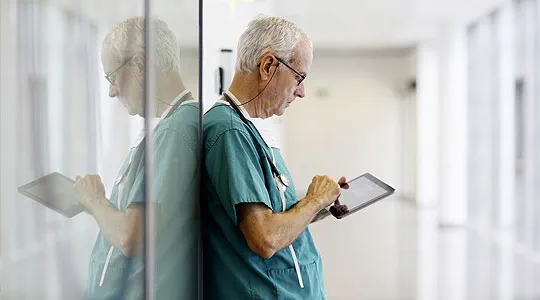Consultant recognition

What we offer you
Bupa recognition can help you build and promote your practice. The benefits include:
- access to a large share of the health insurance market
- raising the profile of your practice through your personal page on Finder, our online directory of Bupa recognised healthcare professionals and healthcare services, which is used by our customers, GPs and the public and receives 110,000 visits a week.
- access to our Providers Online website and other online resources to make running your private practice simple and straightforward.

What we need from you
- keep your information up to date and accurate, including your contact details and your profile on Finder
- invoice us within six months of the first treatment date so we can pay you quickly
- charge the fees set out in your agreement with us so we can set and manage expectations for our customers
- agree to our terms and conditions
Recognition criteria
The criteria to become a Bupa recognised consultant fall into three areas: professional, customer service and administrative. Our professional criteria follow recognised NHS and GMC regulatory requirements. The principal criteria are that you need to:
- hold or have previously held a substantive NHS consultant post or a Ministry of Defence post. Please note that if you’ve previously held either of these types of posts but do not currently, you should complete your application providing the details of your previous post. We may also recognise those with honorary appointments who are on the Specialist Register for the specialty for which they are applying. You’ll need to meet the criteria in the additional information below and we’ll need to ask you for some more information so that we can assess your application
- hold a current General Medical Council (GMC)/General Dental Council (GDC) licence and be listed on the specialist register with no previous hearings or investigations. If you’ve previously undergone hearings or investigations please see the additional information section below which explains what we need to consider your application
- hold a Certificate of Completion of Training
- have current indemnity insurance up to the amount advised by your professional or regulatory body, and attach a copy of your insurance certificate to your application
- agree to charge in line with our agreement
- submit all invoices to us online for eligible treatment for our customers, receive payment from us via BACs, and agree not to send invoices to our customers.
If you don’t hold one of the consultant posts listed in the criteria or if you’ve not completed a Certificate of Completion of Specialist Training, but you’ve an equivalent qualification from overseas, please attach the following in step 3:
- a copy of your clinical CV
- Three references: one from your Responsible Officer, one from a Clinical Director (NHS) OR MAC chair (Private) and one from a Bupa recognised consultant in the same speciality - all written within six weeks of application being escalated or reapplication for Bupa recognition.
Before you apply
You can apply for recognition online in four simple steps which should take less than an hour, depending on the complexity of your practice.
Before you apply, take a look at our Questions and Answers page where you can find more information about becoming Bupa recognised.
Familiarise yourself with how to become a Bupa recognised consultant
Read the guide to becoming a Bupa recognised consultant, it’ll help answer any questions about the support we provide. Check out the ‘questions and answers’ booklet so that you know more about the application process and why there are limits on consultants’ fees etc. The Schedule of Procedures is useful if you’d like to know more about the procedures eligible for funding under our customers’ policies and the rules about billing for them.Guide to becoming a Bupa recognised consultant (PDF, 0.1MB)
Disclosure and barring questions and answers (PDF, 0.2MB)
Schedule of Procedures
Please review the terms and conditions
Please read our
terms and conditions for becoming a Bupa recognised consultant (PDF, 0.2MB)
or if you’re an oral surgeon, there are slightly different terms here for
becoming a Bupa recognised consultant in oral surgery (PDF, 0.1MB).
We’ll ask you to confirm that you agree to them as part of your application.
Confidentiality Guidelines
We’ll only use the information you provide for the purposes of this application and in our ongoing relationship in the event that you become a Bupa recognised consultant.
We have indicated in the application form which information may be shared with our customers, on our website and through other media. You have the opportunity to accept or decline this as you complete the application form.
Gather the documents you need
You’ll need the following documents to complete your application:- your professional qualifications
- the procedures you carry out
- the name and address of the facilities you use
- a completed form (PDF, 0.1MB) confirming your post, either as a substantive NHS consultant or Ministry of Defence consultant, which should be endorsed by your medical staffing/HR department. If you’ve previously held either of these types of post but don’t currently you’ll still be able to apply providing you have the details of your previous post confirmed by your previous employer
- a copy of your current indemnity insurance certificate
- your photographic proof of identity. The proof of identity form (PDF, 0.1MB) explains which documents you can use.
- if you’ve previously undergone GMC/GDC investigations please attach a copy of any case notes and correspondence with the professional body about the investigation in step 3
- if you’ve told us about any declarations, convictions or previous suspensions please attach a copy of investigation case notes and a covering letter explaining the circumstances in step 3
- if you hold or have held a senior lecturer/honorary consultant post please attach the following information in step 3:
- confirmation of having an equivalent or similar scope of NHS, regular non-NHS and private/other private work. This should comprise at least one regular and substantive (eg at least two sessions per week) NHS and/or non NHS clinical commitment
- an appraisal completed within the 12 months before application, which sufficiently explores your practice
- two references from Bupa recognised consultants that explicitly support your unrestricted independent private practice
- a reference from the medical director at your NHS base that explicitly supports your independent private practice.
You will need to scan all documents and upload them onto your application when asked to do so, so it’s important you have them ready before you start.
Apply online
Once you have started your application you will receive a unique reference number where you will be able to check the status of your application. Once we have completed our checks and you are live on our system we will send you an email to confirm. Remember to upload all relevant documents without them we are unable to accept your application.Please don’t start treating our customers until you’ve received an email confirming that your application for Bupa recognition is complete. Your recognition begins on the day you’re added to our list of recognised consultants, and we’re unable to fund any services provided to our patients before that (this includes retrospective invoices).
We’re continually responding to our customers' needs and this is reflected in how we prioritise applications.
Apply onlineHow we choose consultants
Our Open Referral is a simple, straightforward authorisation process. We developed it in response to a request from a corporate client to assist them in managing their healthcare costs and ensuring that their employees would not face unexpected charges from consultants, while maintaining quality of service.
We currently offer it as an option for our business customers, many of whom are large employers who provide health insurance to their staff. Open Referral is similar to services offered by several health insurers, many private hospitals and the NHS. When we help our customers choose a consultant, we also use the following criteria:
- the customer’s clinical requirements - we match them to consultants and their speciality, areas of interest and the procedures they have performed on our patients in the last 12 months
- convenience – we offer customers a choice of consultants practising close to their home or work address
- avoiding shortfalls on fees –we offer customers a choice of consultants who are fee assured, ahead of those who are not, so we can guarantee no shortfalls for in-patient and day-patient treatment
- consultants’ healthcare practices - we look at clinical practice, including surgical techniques used, out-patient consultation rates, follow-up care, and the cost of the care that consultants give our customers
- customer experience – we offer customers the reassurance that all our recognised hospital and clinics have passed a quality assessment and are subject to ongoing monitoring, including assessment of patient experience. We also take into account complaints from our customers about consultants, hospitals and clinics.
Review and removal of Bupa recognition
We work with many consultants in the UK who practise privately.We have a structured process for recognising consultants and we review their practice on an ongoing basis. There are occasions when we need to suspend or review a consultant’s recognition. This happens very rarely.
Our policy for suspension and/or removal of a consultant’s recognition is based on GMC licensing and standards, and British Medical Association (BMA) guidance.
If, for example, a consultant doesn’t have, or loses, their GMC Licence to Practise we won’t recognise them. We may also remove or suspend a consultant’s recognition if we identify treatment practices which represent a threat to patient safety or if fees are excessive, causing complaints from customers about shortfalls or their out-patient benefit being eroded faster than should be expected.
Before removing any consultant’s recognition for matters relating to their business practice, we engage in extensive communication with them to try and reach a resolution. Where the matter is related to patient safety, sometimes we have to act more quickly.
Each year a small number of consultants choose to stop treating our customers and the most common reasons for this are retirement, gaining an academic appointment abroad or no longer continuing in private practice.
Consultants’ fee explained
Bupa recognition is a mark of quality, reassuring our customers that they’re getting quality healthcare from doctors who are competent and experts in their field.
Bupa recognised doctors meet the medical professional standards set by the General Medical Council (GMC) - the UK’s medical regulator - and any relevant specialist bodies. Our recognition is built on criteria that are in line with legal and regulatory requirements to practise in the UK. For example, consultants need to appear on the GMC specialist register.
